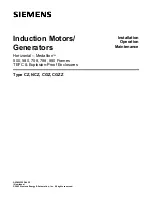
- 11 -
Operation
Trouble Shooting
Between regular maintenance inspections, be
alert for signs of motor trouble. Common
symptoms are listed in the following table.
Correct any trouble immediately and AVOID
COSTLY REPAIR AND SHUT DOWN.
TROUBLE POSSIBLE
CAUSES
CORRECTION
Usually line trouble. Single phasing at
starter.
Check power source. DO NOT check with
motor energized! Check overloads, controls
and fuses. Check voltage and compare with
nameplate rating.
Under Voltage.
Check voltage at motor terminals. Compare to
nameplate.
Motor will not start.
Excessive Load.
Disconnect motor from load to see if it starts
without load. Reduce load or replace motor
with unit of greater capacity.
High Voltage.
Check input voltage. Check for proper
connections.
Unbalanced rotor.
Balance rotor.
Excessive hum.
Excessive wear of sleeve bearings.
Replace bearings. Check to determine cause
of wear and replace as necessary. Check
alignment.
Regular clicking.
Foreign matter in air gap.
Remove foreign matter.
Rapid knocking.
Bad anti-friction bearing or dirt in lubricant.
Replace bearing, clean grease cavities and
renew lubricant.
Misalignment in coupling or feet.
Realign motor and driven equipment.
Accumulation of dirt on fan.
Clean motor.
Vibration in driven machine.
Run motor disconnected from driven load and
check for vibration. Eliminate source in driven
equipment.
Vibration.
System natural frequency (resonance).
Alter rigidity of base structure.
Vibration following motor
repair.
Rotor out of balance; balance weights of
fans shifted on rotor.
Balance rotor.
Overload.
Measure load and compare with nameplate
rating. Check for excessive friction in motor or
complete drive. Reduce load or replace motor
with unit of greater capacity.
Single phase.
Check current, all phases.
Dirt in motor.
Check flow of air.
Check filters if so equipped.
Clean motor.
Unbalanced voltage.
Check voltage, all phases.
Motor overheating.
(Check with thermocouple
or by resistance method,
do not depend on touch).
Rotor rubbing on stator.
Check air gap. Repair motor as necessary.
DANGER
Hazardous
voltage.
Will cause death, serious injury,
electrocution or property damage.
Disconnect all power before working on
this equipment.













































